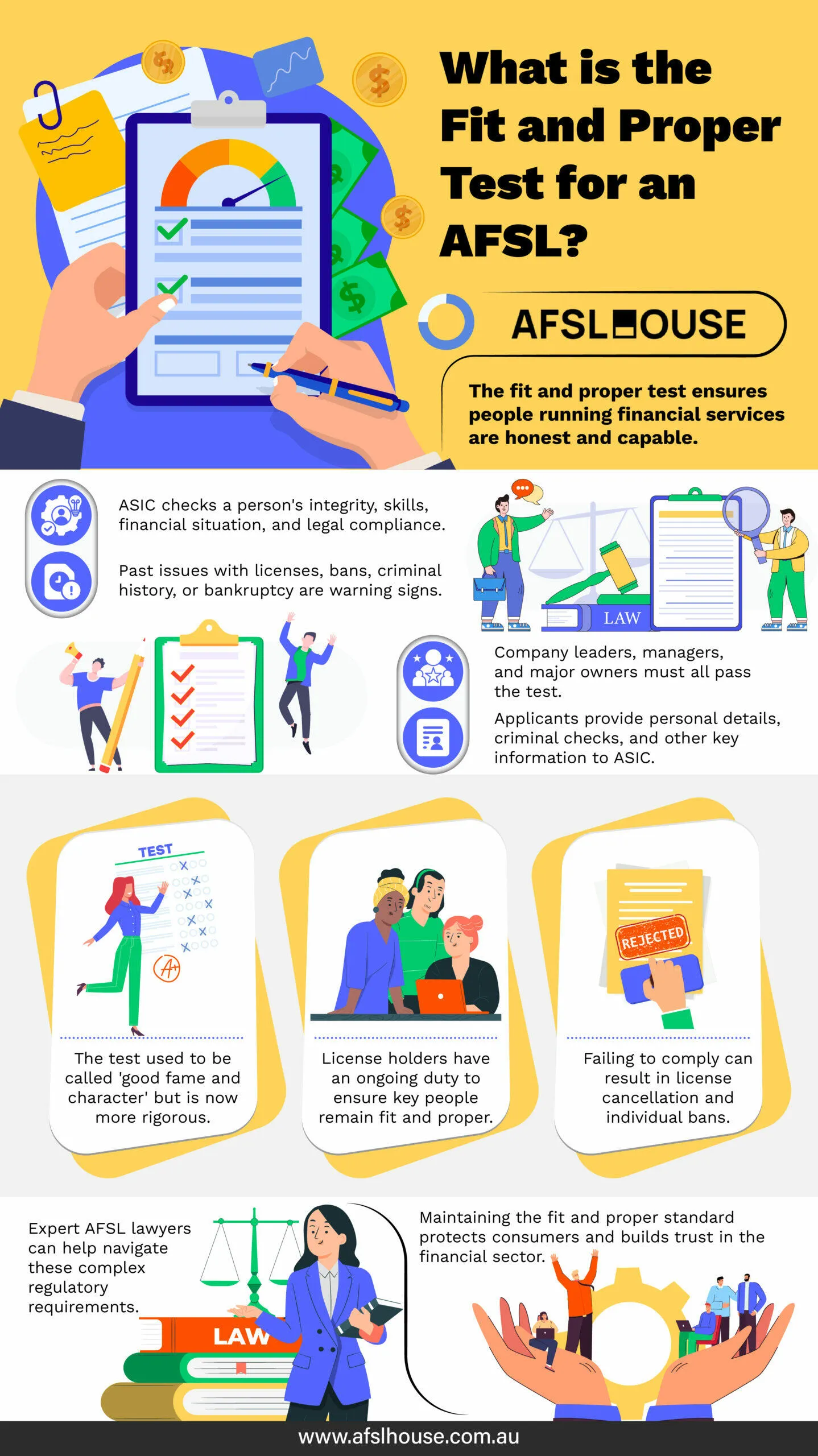Introduction
The fit and proper test is a fundamental requirement for holders of an Australian Financial Services Licence (AFSL), ensuring that those responsible for providing financial services possess the necessary integrity, competence, and financial standing. Established under the Corporations Act 2001 (Cth), this regulatory standard plays a crucial role in safeguarding consumer interests and maintaining the integrity of the financial services market.
AFSL holders must demonstrate compliance with the fit and proper test by thoroughly assessing and documenting the suitability of their officers, managers, and other key personnel. Understanding and adhering to these regulatory requirements is essential for maintaining the AFSL and fostering trust within the financial sector.

Understanding the Fit and Proper Test
Definition and Purpose of the Fit and Proper Test
The fit and proper test is a regulatory requirement imposed by the Australian Securities and Investments Commission (ASIC) to assess the suitability of individuals involved in an AFSL application or holding an existing licence. This test evaluates the integrity, competence, and financial standing of applicants to ensure they can responsibly provide financial services. By implementing this test, ASIC aims to maintain the integrity and reliability of the financial services industry, protecting consumers and the broader financial system from potential misconduct.
Criteria for Meeting the Fit and Proper Test
ASIC assesses whether individuals meet the fit and proper criteria based on several key factors:
- Integrity and Honesty: Individuals must demonstrate high ethical standards and honesty in their personal and professional conduct.
- Competence: Applicants must possess the necessary skills and knowledge to perform their roles effectively within the financial services sector.
- Financial Standing: A stable financial background is required to ensure that applicants can manage their responsibilities without undue financial pressure.
- Legal Compliance: Individuals must not be disqualified by law from performing their roles, which includes having no convictions for relevant offences within the past ten years.
- Conflict of Interest Management: Applicants must either have no conflicts of interest or demonstrate that any existing conflicts do not pose a material risk to their ability to perform their duties appropriately.
These criteria ensure that only qualified and trustworthy individuals are granted AFSLs, thereby upholding the standards of the financial services industry.
Get Your Free Initial Consultation
Consult with one of our experienced AFSL Lawyers today.
Specific Considerations When Making the Fit and Proper Assessment
Examining Past Conduct and Associations
When assessing whether an individual meets the fit and proper standard, which is a higher standard than the previous “good fame and character” test, ASIC reviews various aspects of their past conduct and associations. Key factors considered include:
- Suspended or Cancelled Licences: ASIC considers whether the individual has ever had an AFSL or Australian Credit Licence (ACL) suspended or cancelled. This includes examining any prior involvement with entities that faced similar actions. The fit and proper person test is an ongoing requirement, and ASIC can suspend or cancel a license if a relevant person no longer meets the requirements.
- Banning Orders: ASIC evaluates whether the individual has been subject to any banning orders or disqualification orders under relevant legislation, such as the Corporations Act 2001 (Cth) or the National Consumer Credit Protection Act 2009 (Cth). Failing the fit and proper test can lead to ASIC refusing, suspending, or cancelling a license, and even banning the person.
- AFCA Determinations: ASIC also considers whether the person has ever been linked to a refusal or failure to give effect to a determination made by the Australian Financial Complaints Authority (AFCA).
- Banned from Credit Activities: ASIC will also check if the individual has been banned from engaging in a credit activity under a state or territory law.
- Other Information: ASIC may also consider any other relevant information given to ASIC by a state or territory authority.
Considering Criminal History and Insolvency
ASIC places significant emphasis on an individual’s criminal history and any history of insolvency when determining their fit and proper status. The fit and proper person test applies not only to the applicant but also to officers, controllers, and officers of controllers. The key considerations include:
- Criminal Convictions: ASIC assesses any criminal convictions within the last 10 years. This includes not only convictions for dishonesty but any conviction in the past 10 years that may raise concerns about the individual’s integrity.
- Insolvency History: ASIC evaluates whether the individual has ever been classified as an insolvent under administration or has been linked to a Chapter 5 body corporate. This assessment helps determine the individual’s financial standing and reliability.
- Disqualified from Managing Corporations: The sources specify that ASIC also considers whether the person has been disqualified from managing corporations.
These criteria are crucial for ASIC to ensure that individuals involved in providing financial services are trustworthy and capable of fulfilling their roles responsibly. ASIC relies on specific documentation, including criminal history checks and a Statement of Personal Information, to assess an individual’s fitness. While applicants aren’t required to submit bankruptcy checks, ASIC will review the bankruptcy register, and licensees have an ongoing responsibility to conduct their own checks.
Speak with an AFSL Lawyer Today
Request a Consultation to Get Started.
Who is Considered a Fit and Proper Person?
Officers and Senior Managers
Officers and senior managers are essential to the governance and operation of an organisation holding an AFSL. These individuals must satisfy the fit and proper test to ensure they possess the necessary integrity, competence, and financial standing to oversee financial services effectively.
Officers typically include:
- Directors
- Company Secretaries
- Chief Executive Officers (CEOs)
- Chief Financial Officers (CFOs)
- Senior Executives who influence significant business decisions
Senior managers are defined as individuals who participate in decision-making processes that impact the entire business or hold the capacity to significantly influence the organisation’s financial health.
Controllers and Their Officers
Controllers hold significant influence over the strategic direction and operational policies of an AFSL holder. Controllers and their respective officers are also subject to the fit and proper test to ensure they uphold the same standards of integrity and competence as officers and senior managers.
A controller is defined as:
- Individuals or Groups who exercise control over the applicant’s financial and operating policies.
- Those who can determine the applicant’s financial standing and business practices.
Controllers can be individuals or corporate entities. When the controller is a corporate entity, all officers of the controlling entity must also satisfy the fit and proper test. Control is determined through various means, such as:
- Voting Rights: Casting more than half the votes at a general meeting.
- Shareholding: Holding directly or indirectly more than half of the issued share capital.
- Board Composition: Having the capacity to control the composition of the board.
- Decision-Making Capacity: Determining the outcome of decisions about financial and operating policies.
Get Your Free Initial Consultation
Consult with one of our experienced AFSL Lawyers today.
Application Process and Required Documentation
Necessary Information and Documentation
When applying for an AFSL, applicants must provide comprehensive information and documentation to satisfy the fit and proper test. The essential requirements include:
- Personal Details:
- Full name of each fit and proper person
- Position within the organisation
- Residential address
- Criminal History Checks:
- National criminal history checks are required for each jurisdiction where the individual has resided for more than 12 months in the past 10 years.
- These checks must be no older than 12 months at the time of application.
- Statement of Personal Information:
- A completed questionnaire detailing personal conduct over the last 10 years.
While bankruptcy checks were previously required for each fit and proper person, recent changes have shifted this responsibility to ASIC, eliminating the need for applicants to provide these checks themselves.
Additionally, applicants must supply any other relevant information as specified by ASIC to assess the suitability of individuals associated with the licence.
Permissible Certifications and Exceptions
In certain circumstances, applicants can submit permissible certifications in lieu of some standard documentation. These exceptions are subject to specific conditions:
- Permissible Certifications:
- Certifications can replace criminal history checks and statements of personal information for officers, partners, trustees, and senior managers of intermediate controllers.
- These certifications must be based on section 913BA(1)(e)-(f) of the Corporations Act 2001 (Cth).
- Conditions for Exceptions:
- Certifications are not accepted for officers of the ultimate holding entity of the applicant.
- Even with permissible certifications, ASIC may request additional information to complete its assessment.
- Equivalent Requirements:
- For controllers subject to equivalent fit and proper person requirements under other regulatory regimes, alternative evidence may be accepted.
- Applicants must provide sufficient proof that relevant individuals are subject to equivalent standards elsewhere.
These permissible certifications and exceptions provide flexibility for certain applicants, but it is crucial to ensure that all conditions are strictly met to satisfy ASIC’s requirements.
Speak with an AFSL Lawyer Today
Request a Consultation to Get Started.
Regulatory Changes and Their Impact
Transition from ‘Good Fame and Character’ to ‘Fit and Proper’
The shift from the ‘good fame and character’ standard to the more rigorous ‘fit and proper’ test has elevated the requirements for AFSL applicants. Under the old standard, ASIC primarily considered convictions within the last 10 years involving dishonesty and previous AFSL suspensions. The new fit and proper test broadens these criteria to include any convictions within the last 10 years, regardless of their nature, and incorporates considerations from the ACL regime. Furthermore, the scope of individuals subject to the test has expanded. Now, all officers of a body corporate, not just those directly responsible for the AFSL, as well as controllers and their officers, must satisfy the fit and proper requirements.
Ongoing Obligations and Compliance
AFSL holders must now adhere to continuous compliance with the fit and proper test. This involves implementing regular checks, such as annual criminal history and bankruptcy screenings, to ensure that all relevant individuals remain fit and proper. Licensees are also required to establish internal procedures to monitor and document the ongoing fitness of their officers and controllers. Failure to maintain these obligations can lead to severe consequences, including the suspension or cancellation of the AFSL and the issuance of banning orders against individuals who do not comply.
Get Your Free Initial Consultation
Consult with one of our experienced AFSL Lawyers today.
Conclusion
Maintaining an AFSL necessitates strict compliance with ASIC’s fit and proper person test. This requirement ensures that all officers, managers, and controllers possess the integrity, competence, and financial stability essential for responsibly providing financial services. Adhering to these standards not only upholds the licence holder’s credibility but also protects consumer interests and fosters trust within the financial sector.
Failing to meet the fit and proper criteria can lead to significant repercussions, including the suspension or cancellation of the AFSL and the imposition of banning orders on individuals. For tailored solutions and practical support in navigating the complexities of the fit and proper test, consider contacting our award-winning AFSL lawyers at AFSL House. We offer expert guidance and resources to help AFS licensees ensure compliance and maintain the fitness and propriety of their key personnel, promoting confidence and integrity within their business.
Frequently Asked Questions
The fit and proper test ensures that individuals involved in an AFSL possess the necessary integrity, competence, and financial standing to responsibly provide financial services.
All officers of a body corporate applicant, partners or senior managers of a partnership applicant, trustees or senior managers of a multiple trustee applicant, controllers of the applicant, and their respective officers must satisfy the fit and proper criteria.
ASIC evaluates individuals based on several key factors, including integrity and honesty, competence, financial standing, legal compliance, and conflict of interest management.
Applicants must provide a national criminal history check, a bankruptcy check, and a completed Statement of Personal Information for each fit and proper person. In some cases, permissible certifications or alternative evidence may be accepted.
The fit and proper test is more comprehensive, considering a wider range of factors such as any conviction in the last 10 years, bans under other regulatory regimes, insolvency history, and adherence to AFCA determinations. It also applies to a broader group of individuals within the organisation.
Failing the test can lead to the suspension or cancellation of the AFSL and the imposition of banning orders on individuals, restricting them from holding certain positions within the financial services industry.
Yes, the fit and proper test is an ongoing requirement. Existing AFSL holders must comply with the new standards and may need to conduct regular assessments to ensure continued compliance.
In certain circumstances, permissible certifications or alternative evidence may be accepted in lieu of standard documentation. However, these exceptions are subject to specific conditions and may not apply to all individuals.
Licensees are expected to perform regular checks, typically annually, to ensure that all relevant individuals continue to meet the fit and proper criteria. This includes conducting criminal history and bankruptcy checks, as well as updating any personal information.
Disclaimer: All information provided in this article is strictly general in nature and is not intended to be, nor should it be relied upon as, legal advice.









